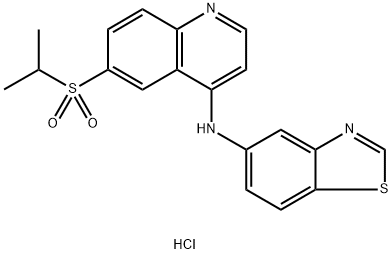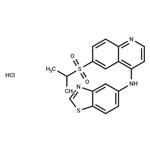GSK-872 hydrochloride is a RIPK3 inhibitor, which binds RIP3 kinase domain with an IC50 of 1.8 nM, and inhibits kinase activity with an IC50 of 1.3 nM. GSK-872 hydrochloride decreases the RIPK3-mediated necroptosis and subsequent cytoplasmic translocation and expression of HMGB1, as well as ameliorates brain edema and neurological deficits in early brain injury[1][2][3].
GSK-872 (GSK’872; 0.01-3 μM; 24 hours) blocks TNF-induced necroptosis in human HT-29 cells in a concentration-dependent manner[1].
GSK-872 hydrochloride (25 mM; intracerebroventricular injection) can attenuate brain edema and improve neurological function following subarachnoid hemorrhage (SAH) and reduce the number of necrotic cells. GSK-872 hydrochloride can also decrease the protein levels of RIPK3 and MLKL, and cytoplasmic translocation and expression of HMGB1, an important pro-inflammatory protein[3].
[1]. Mandal P, et al. RIP3 induces apoptosis independent of pronecrotic kinase activity. Mol Cell. 2014 Nov 20;56(4):481-95. [2]. Arora D, et al. Deltamethrin induced RIPK3-mediated caspase-independent non-apoptotic cell death in rat primary hepatocytes. Biochem Biophys Res Commun. 2016 Oct 14;479(2):217-223. [3]. Chen T, et al. Inhibiting of RIPK3 attenuates early brain injury following subarachnoid hemorrhage: Possibly through alleviating necroptosis. Biomed Pharmacother. 2018;107:563-570.

